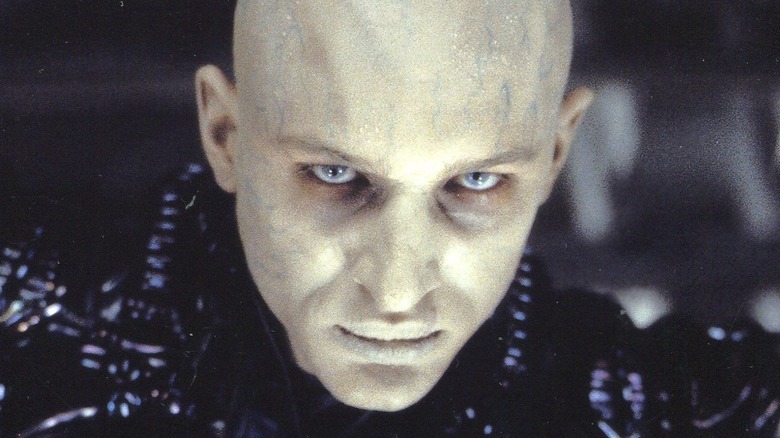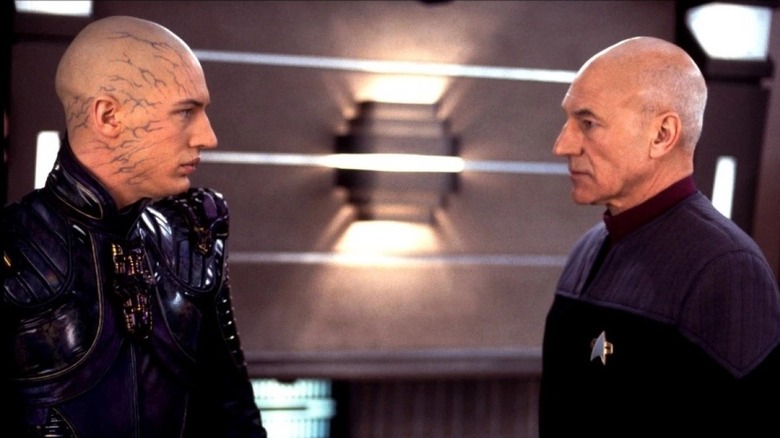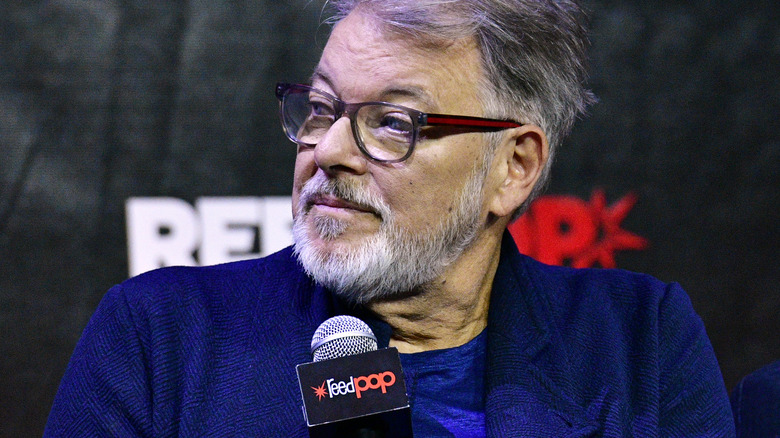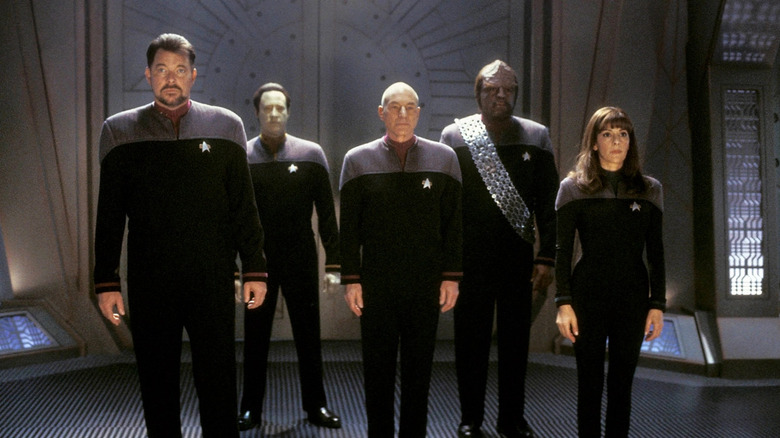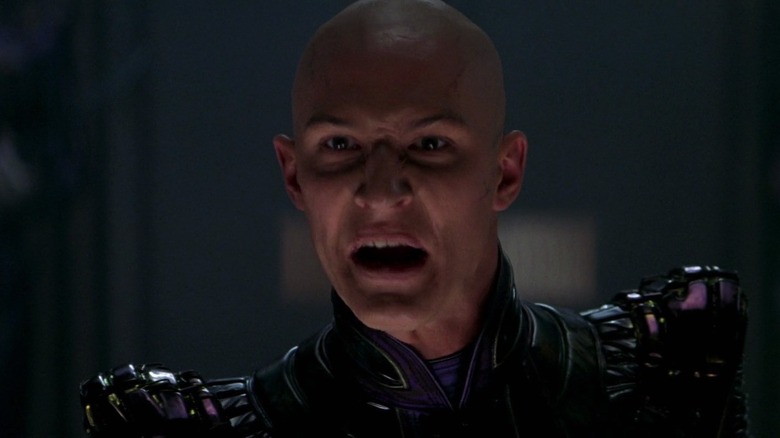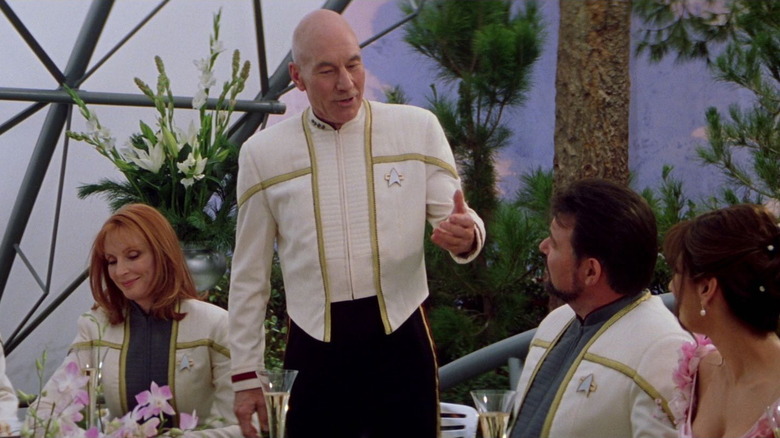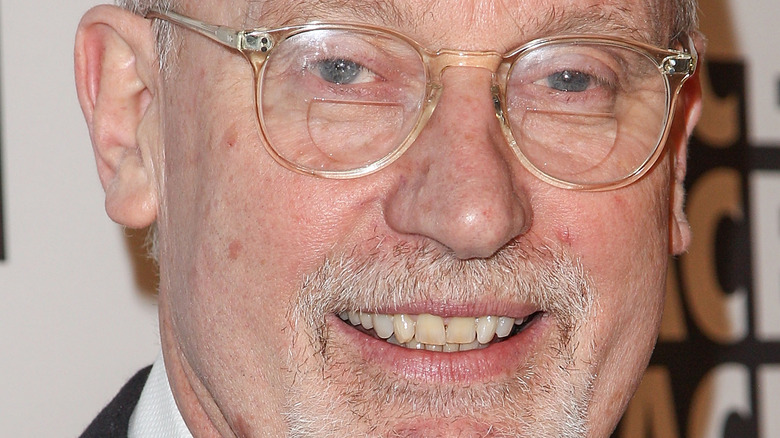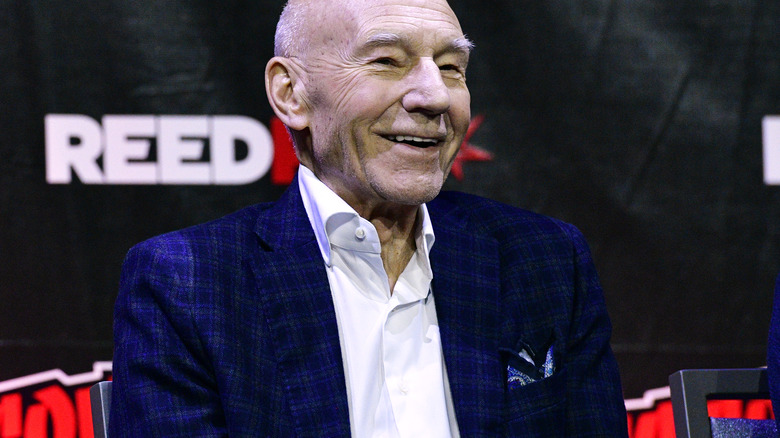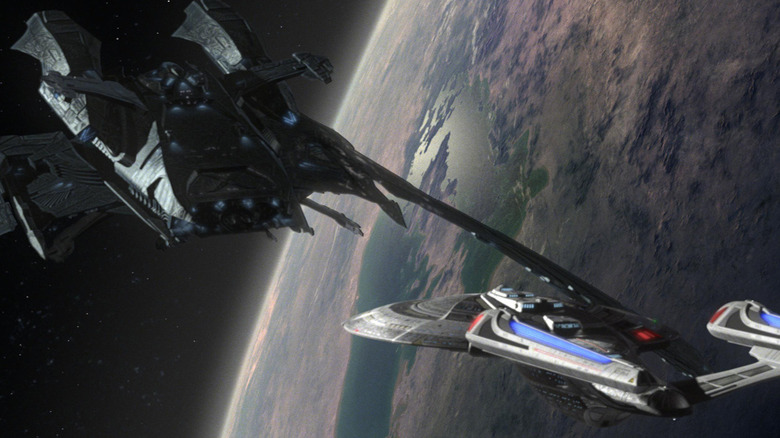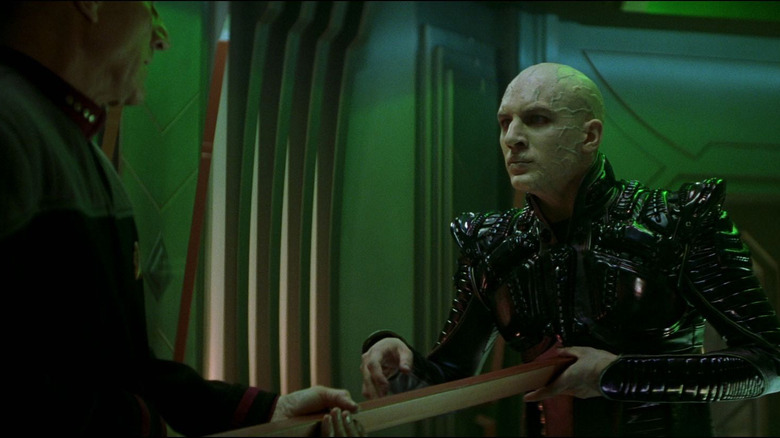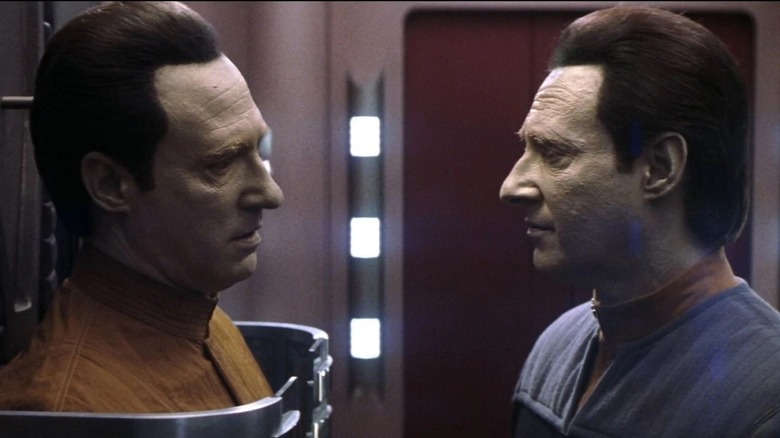Seek Out Strange New Worlds Of Knowledge With These Star Trek: Nemesis Facts
"One man's sunset is another man's dawn." So goes the phrase uttered by Jimmy Stewart in the ending of "An American Tail: Fievel Goes West." Rarely is the truth of that expression better exemplified than with the rebooted vision of "Star Trek" that kicked off in 2009. The dawn of that new phase of the franchise, headlined by actors like Chris Pine, required the prior era of "Next Generation" movies to experience its sunset. That finale came with "Star Trek: Nemesis," a 2002 entry in the "Star Trek" series that saw Tom Hardy playing Shinzon, a young evil clone of franchise mainstay Picard (Patrick Stewart).
"Nemesis" was closing the book on the "Next Generation" characters, but that momentous occasion did nothing to help stir up goodwill from "Star Trek" fans towards the project. The feature proved divisive among Trekkies (per Den of Geek), but that reputation doesn't mean "Nemesis" is devoid of interesting or notable elements. Several facts about the movie's production, release, and lasting legacy are actually quite fascinating, particularly in how they shed some extra clarity on why "Nemesis" turned out like it did. "Nemesis" turned out to be enough of a dud to ensure that it was the "sunset" project for an era of "Star Trek," but these facts prove there's far more to its story than just a divisive fan reputation.
Star Trek: Nemesis could've starred entirely new characters
"Star Trek: Nemesis" wasn't just any entry in the "Star Trek" movie franchise — it was the first installment in the saga to be released in the 21st century. It was a new era for this cosmic series and, understandably, some of those in charge of setting a course for the future of "Trek" were beginning to wonder if it was time to shake things up. Producer Rick Berman explained to StarTrek.com that the earliest discussions about "Star Trek: Nemesis" imagined it as a wholly different movie. Specifically, there were hopes from studio executives to make the film without the "Next Generation" cast members.
Berman went on to elaborate that the idea behind this notion was that cast members like Patrick Stewart and Brent Spiner were getting older and that Paramount brass wanted some brand-new faces to anchor the future of "Star Trek." However, Berman vehemently opposed this notion for several reasons. Among them was the fact that he didn't want to take away from the then-new TV show "Star Trek: Enterprise," which was also planning to introduce a bunch of new "Star Trek" characters. Berman also felt that audiences would be dying to see the "Next Generation" characters again given how long it'd been since their last movie. With these factors in play, the road was paved for the "Next Generation" cast members to return, and for "Star Trek: Nemesis" to even exist.
The excitement over John Logan writing Nemesis
For the fourth movie headlined by the "Star Trek: The Next Generation" characters, a screenwriter inexperienced with penning scripts in the "Star Trek" universe was hired. Though this maneuver meant that there was the possibility of awkwardly merging the writer with this franchise's dense lore, there was also the intriguing possibility of this decision cementing "Nemesis" as a totally different animal compared to its predecessors. The writer hired for this job was none other than John Logan, a man responsible for a wide range of acclaimed screenplays, including the one for "Gladiator."
Looking back on this hiring, producer Rick Berman told StarTrek.com how stoked he was about the notion of Logan bringing fresh creative blood into the saga. Plus, Logan was a massive devotee of the "Next Generation" TV show, which ensured that he had plenty of familiarity with this particular batch of "Star Trek" characters. Given all the award season love Logan's writing for "Gladiator" had received, there was also the exciting notion that Logan's presence on the project could lend "Star Trek: Nemesis" a sense of prestige. Though Berman would later have major qualms with the original script for "Star Trek: Nemesis," initially, the prospect of bringing John Logan into the franchise inspired nothing but joy for the producer.
Tom Hardy's pre-Nemesis relationship to Star Trek
Some people who are take on a project in the "Star Trek" franchise come into the gig with the wide-eyed enthusiasm of a child being let into an especially fancy toy store. Dreams are coming true in this moment, dreams that have been stewing for so long in their hearts. But for others, that deep personal connection to the franchise may be absent. Nobody can be up on all pop culture properties, and it's understandable if somebody's managed to secure a sizeable acting role on "Star Trek" without being a devotee to the saga up to that point. So it was with Tom Hardy, who entered his role in "Star Trek: Nemesis" being a novice to the saga.
Hardy explained to IGN that he had long been aware of "Star Trek" simply because of its ubiquity in pop culture. There's no way to avoid catchphrases like "live long and prosper" or "beam me up, Scotty," after all. However, he didn't exactly grow up following every "Star Trek" TV show and movie, though he was well aware enough of the pop culture enormity of the property that he recognized how getting cast in "Nemesis" was a tremendous honor. Hardy didn't walk into the set of "Nemesis" a die-hard Trekkie, but he also wasn't oblivious to being part of a creative legacy.
Jonathan Frakes regrets not directing Nemesis
Like Leonard Nimoy and William Shatner, Jonathan Frakes was a "Star Trek" actor who also stepped behind the camera as a director for the Enterprise's big-screen voyages. Frakes made his feature film directorial debut on "Star Trek: First Contact" before continuing his exploits in the field with "Star Trek: Insurrection." Given his proven skill in helming movies about the "Next Generation" characters, one would imagine that he would've been a natural pick to direct "Star Trek: Nemesis." However, Stuart Baird ended up taking the directorial reins on this feature.
Frakes explained to Vulture that he consciously passed on the chance to direct "Nemesis" because he was concerned he would've restricted his future as a filmmaker by being only known for directing "Star Trek" movies. With this concern at the front of his mind, Frakes opted to pursue other motion pictures like "Clockstoppers" instead. However, with the benefit of hindsight, Frakes wishes he'd stuck around and helmed "Nemesis," especially since he notes that he's enjoyed directing installments of modern "Star Trek" TV shows like "Star Trek: Discovery." The "Star Trek" franchise has been a boon to the career of Frakes, and his presence as a director was clearly missed on "Nemesis."
How Nemesis was planned to be different from its predecessor
"Star Trek: Insurrection" wasn't hated in its initial theatrical run, but it also didn't garner much enthusiasm from critics. The biggest issues with the film were perceived to be its pacing and a central romance involving Picard that audiences just couldn't get invested in. Little in it was outright terrible, but there also wasn't much in it to drive up fan enthusiasm. For any subsequent "Star Trek" movies, consideration would have to be taken over the perceived shortcomings of this outing. When it came to "Star Trek: Nemesis," Patrick Stewart was convinced more than anyone that the cast and crew had figured out how to avoid those flaws of the past.
Stewart reflected on "Insurrection" to IGN primarily by reflecting how dialogue-heavy the feature was, and how its particular focus on romance would not factor into "Nemesis." Those elements that had defined "Insurrection" and its reputation among "Star Trek" fans were at the top of Stewart's mind when he talked to "Nemesis" screenwriter John Logan about the narrative direction of this new feature. Being conscious of those flaws helped mold the creative direction of "Star Trek: Nemesis," which demonstrated a commendable willingness on the part of the filmmakers to recognize the mistakes of the past ... even if it didn't ensure that "Star Trek: Nemesis" would avoid its own unique shortcomings.
The troubled pay negotations of Star Trek: Nemesis
Paramount Pictures has often been in a tricky place with "Star Trek." The brand name is technically iconic and, thanks to its cosmic backdrops and need to provide something you couldn't see on the various TV shows in the franchise, the movies always require a pretty penny to be realized on the big screen. However, international audiences have never been as enamored with the characters as North American viewers, which has ensured that the "Star Trek" movies have never been as big at the global box office as other juggernaut franchises like the "Lord of the Rings" or "Harry Potter" movies. These warring elements have ensured that budgets for "Star Trek" movies have always been a point of contention, and "Star Trek: Nemesis" was no exception.
As recounted on a "Film Stories" podcast episode, Paramount was determined to make "Nemesis" on a lower budget than the $70 million price tag of its predecessor, "Star Trek: Insurrection." Making this film cheaper meant trying to secure lower fees from the actors, which didn't go over well at all, especially for Patrick Stewart. Thanks to the "X-Men" movies, Stewart was a bigger deal than ever and he wasn't about to do "Nemesis" for cheap. Eventually, Stewart scored a $14 million payday for "Nemesis," a substantial chunk of the movie's final $60 million budget.
Why there was a lengthy gap between Insurrection and Nemesis
Since the "Star Trek" film series began in 1979 with "Star Trek: The Motion Picture," the franchise had proven quite consistent in delivering new installments. Though they weren't churning out new movies annually like the "Saw" or Marvel Cinematic Universe sagas later would, between 1979 and 1998, there was never more than a three-year gap between "Star Trek" movies. This constant pace was even maintained once the big-screen baton got passed from the initial Starship Enterprise crew to the "Next Generation" cast. However, after "Star Trek: Insurrection" in December 1998, it would take a whopping four years for "Star Trek: Nemesis," its follow-up, to hit theaters. Though not necessarily an eternity, it was still the longest gap, up to that point, between "Star Trek" installments.
Patrick Stewart joked to IGN that he wanted to take credit for why it had taken so long to produce a new "Star Trek" movie before delving into the real reason for this prolonged gap. Stewart and other key members of the franchise's creative team just felt like things were being produced too quickly in the series up to that point and wanted to give everyone some breathing room before diving into another "Star Trek" feature. After spending time away from Picard, Stewart was ready to roll and shoot "Star Trek: Nemesis."
Nemesis director Stuart Baird's feelings about being a Star Trek novice
While screenwriter John Logan had been a "Star Trek" devotee for years before penning the screenplay to "Star Trek: Nemesis," director Stuart Baird was in the total opposite camp. Baird had no prior experience with the franchise and even his filmmaking experience was limited to just two directorial credits before "Nemesis" (though he'd been a prolific editor for decades). Some filmmakers might be daunted by entering such unfamiliar territory, but not Baird. He was very open about being nonchalant and relaxed regarding his role as a director here, especially in terms of being a "Star Trek" novice.
Baird admitted to BBC that there were occasional problems in the creative process of "Star Trek: Nemesis" rooted in his inexperience with franchise lore, but in the end, he didn't perceive it as being a massive issue. In fact, his lack of experience with "Star Trek" informed his approach to the whole enterprise (so to speak), as he wanted to build a movie that functioned as a standalone narrative rather than something deeply entrenched in dense continuity. Stuart Baird was far from a "Star Trek" expert in his time on the "Nemesis" set, but at least he leaned into it rather than trying to pass himself off as the ruler of the Trekkies.
Patrick Stewart was not a fan of Nemesis
"Star Trek: Nemesis" doesn't have the most sterling reputation among hardcore fans of the "Star Trek" franchise, and that opinion isn't just restricted to viewers. Key actors involved in the film have also come out and criticized "Nemesis" years later for its woeful shortcomings. Among those who've expressed disdain for the final product was its leading man, Patrick Stewart.
Stewart recalled to Variety while promoting the TV show "Picard" that his ultimate feelings about "Nemesis" were solidified by his positive experience on "Logan." As a curtain call (at the time) for his take on Charles Xavier, Stewart was so pleased with how bold and emotionally fulfilling "Logan" was for both the audience and the actors. By contrast, Stewart felt that "Nemesis," which functioned as the initial ending to his "Next Generation" character Picard, was incredibly underwhelming, and getting to experience a proper send-off like "Logan" just reinforced that.
Stewart didn't go into specifics on what about "Nemesis" made him so frustrated, but the endless fan critiques over the movie make it clear there are endless possibilities for what might've disappointed him. Interestingly, Stewart has recently expressed enthusiasm for the idea of one more feature film anchored by the "Next Generation" crew, another indication that Stewart might want a re-do of "Nemesis" functioning as the true final chapter in Picard's adventures.
The abandoned Star Trek: Nemesis sequel
It would take nearly two decades for a proper follow-up to "Star Trek: Nemesis" to appear in the form of the TV series "Picard," but initially, there were plans to continue to the adventures of the "Next Generation" crew on the big screen. Brent Spiner explained to DreamWatch Magazine (via SciFi Heaven) in 2006 that "Nemesis" screenwriter John Logan had an elaborate idea for a follow-up that sounds like it would have been the "Avengers: Endgame" of "Star Trek" movies. In this proposed sequel, all of the biggest "Star Trek" baddies would've assembled for an evil mission, which would've required Picard to travel throughout time and pick up various iconic "Trek" characters to help him save the day.
The project never got further than just being an interesting pitch, though, with Spiner explaining that the inherent budgetary challenges of pulling off such an ambitious production meant that it never would've gotten off the ground even if "Star Trek: Nemesis" hadn't cratered at the box office. While future "Star Trek" movies would explore an alternate timeline focused on younger versions of Kirk and Spock rather than exploring storylines continuing from the events of "Nemesis," "Picard" at least would eventually deliver more exploits focused on the "Next Generation" characters.
The dismal box office run of Nemesis
Before 2002, only one "Star Trek" movie had made under $87 million worldwide. The franchise had managed to deliver consistently solid box office results, with five of its original nine installments cracking $100 million worldwide. But that glorious box office streak came to an abrupt end in 2002 with "Star Trek: Nemesis," which came in staggeringly low compared to its predecessors. Carrying a $60 million budget, "Nemesis" only grossed $67.3 million worldwide. That was the lowest global total for a "Star Trek" film up to that point, even before taking inflation into account.
You didn't need to be as smart as the most intelligent Starfleet officer to figure out why "star Trek: Nemesis" flopped at the box office. December 2002 was jam-packed with big movies, in a field dominated by fellow genre blockbuster "The Lord of the Rings: The Two Towers," and it was always going to be difficult for "Star Trek: Nemesis" to stand out in the crowd. The largely negative response to the film from fans and critics didn't make it any easier for Paramount Pictures to convince moviegoers to give "Nemesis" a chance. The long-running saga had hit a box office low point, and the ripple effects of the financial shortcomings of "Star Trek: Nemesis" would be enormous.
The legacy of Nemesis
Though it wasn't looked on fondly by either fans or longstanding members of the "Star Trek" creative team, "Star Trek: Nemesis" did end up having a significant impact on the broader franchise. However, rather than inspiring beloved new characters or unique visual details incorporated into other productions, "Star Trek: Nemesis" provided a blueprint for what Paramount Pictures shouldn't do with the franchise. The studio put the saga into hibernation and would only revive it in 2009 with "Star Trek" from director J.J. Abrams, a motion picture that gave the timeline a clean slate of continuity to work from.
Meanwhile, the direction of the later TV series "Picard" would attempt to right some wrongs within "Star Trek: Nemesis" and give the character a more proper conclusion than the one offered by the 2002 film. An interesting, more positive aspect of the legacy of "Star Trek: Nemesis" would be the career of Tom Hardy. "Nemesis" provided the actor with his first major role, but it would not be his last. Hardy would go on to be an Oscar-nominated performer and a fixture of highly lucrative blockbusters, including the "Venom" movies. Few, if any, of these performances would echo his work in "Nemesis," but this "Star Trek" title did help put him on the map as an actor. Hardy's subsequent career ensures that not everything about "Nemesis" needs to be erased or minimized in the minds of the general public.
